
The Internet's Premier Classical Music Source
Related Links
-
Find CDs & Downloads
Amazon - UK - Germany - Canada - France - Japan
ArkivMusic - CD Universe
Find DVDs & Blu-ray
Amazon - UK - Germany - Canada - France - Japan
ArkivMusic-Video Universe
Find Scores & Sheet Music
Sheet Music Plus -
Search Amazon
Recommended Links
Site News
Giuseppe Verdi
Otello
Synopsis
Cast of Characters
(in order of vocal appearance):
- Montano, Bass, Otello's predecessor as Governor
- Cassio, Tenor, a Captain
- Iago, Baritone, Otello's ensign
- Roderigo, Tenor, a Venetian gentleman
- Otello, Tenor, A General in the Venetian Army
- Desdemona, Soprano, wife of Otello
- Emilia, Mezzo-Soprano, Iago's wife and Desdemona's attendant
- Herald, Baritone
- Lodovico, Bass, Ambassador of the Venetian republic
- Soldiers and sailors from Venice and the people of Cyprus.
The Opera takes place at the end of the Fifteenth Century. It occurs in a seaport in Cyprus.
Act I | Act II | Act III | Act IV
Act I
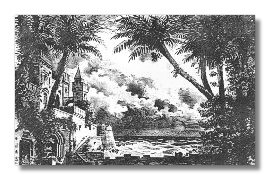
A seaport in Cyprus. It is night and a storm rages.
The Cypriots are gathered at the harbor awaiting the arrival of Otello's ship. The storm grows in intensity as the safety of the ship is in doubt. Women from the island join the men in a chorus calling upon God to deliver the ship and their General (Dio, fulgor della bufera!). The mainsail breaks and the ship heads toward the breakers. The crowd cries for help as Iago comments to Roderigo, "Let the sea be her tomb!" At that moment, the ship is saved to everyone's reflief. Otello bursts upon the scene proclaiming victory over the Turks. (Esultate!) The Cypriots join in the cheers proclaiming, "Long Live Otello!" The storm begins to disperse.
Iago approaches Roderigo and asks about his thoughts (Roderigo, ebben). Roderigo is upset about Desdemona and how to win her love. Iago promises Desdemona to him: "No woman's weak vow is too difficult for my talents." He adds that the reason for his hatred of the Moor is Cassio. "Cassio usurped my rank - rank I earned many times over in battle." He adds, "I would not want an Iago around me." He leads Roderigo upstage to plot their course as a bonfire begins to blaze and roar. The Cypriots gather around it praising the fire (Fuoco di gioa).
Iago calls upon Roderigo to fetch more wine for Cassio (Roderigo, beviam!). Cassio protests that he has had enough wine. Iago goads him into drinking more by toasting the marriage of Otello and Desdemona. Cassio praises Desdemona's radiance as Iago tells Roderigo to beware of Cassio: "He will get in your path. If he gets drunk, well, he is lost! Make him drink." Iago begins the brindisi (Inaffia l'ugola!) (1). Roderigo keeps filling Cassio's cup. The crowd joins the lively song as Iago and Roderigo succeed - Cassio becomes drunk. Iago tells Roderigo to start a quarrel with Cassio.
Montano arrives to escort Cassio to his turn at guarding the castle. Cassio staggers toward Montano who inquires, "What do I see?" Iago retorts that Cassio is like this every evening. Montano says that Otello should be informed of this. Roderigo laughs at Cassio, who charges him as the two trade insults. Montano separates them, but is drawn into the brawl by Cassio. The crowd also joins in the foray as sword fights and general mayhem becomes the rule of thumb. Iago commands Roderigo to spread confusion and horror through the harbor. Iago then calls for the fighting to end. Montano is wounded as alarms sound and the chaos spreads.
Otello bursts upon the scene, commanding everyone to drop their weapons (Abbasso… le spade!). He asks Iago to explain what has happened. Iago claims ignorance and adds, "I would rather have lost my legs than have them carry me to this sight." Otello turns on Cassio and asks how he could have forgotten himself so. He offers no explanation and instead asks for pardon. Otello discovers that Montano has been wounded. His anger increases. Desdemona enters as Otello strips Cassio of his rank. Iago declares triumph as Otello orders him to restore peace to the village. He then orders the area cleared immediately.
The scene empties and Verdi begins one of the most expansive love duets he wrote. The duet is divided into three main sections. Otello declares that silence has finally arrived (Già nella notte densa). He rejoices in the embrace of his spouse and her love for him. Desdemona praises her superb warrior. She also remembers the lonely evenings apart and rejoices in their embrace. The duet turns to talk of their courtship (Quando narravi). Otello describes the battles he had told her about. She adds also of the time he spent as a slave. Desdemona praises him for the dangers he survived and Otello says he loved her for it. The mood changes as Otello is caught up in the esctasy of the moment (Venga la morte!). They both pray that their love will be eternal. Otello asks for a kiss and yet another kiss. They retire slowly to the castle, arm in arm as the curtain slowly descends.
Act II
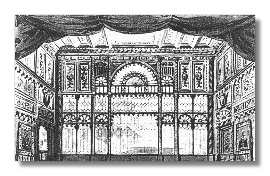
A hall on the ground floor of the castle that opens to a garden in the back.
The scene opens to Iago consoling Cassio (Non ti crucciar). Iago tells him to trust him and he will once again bask in the presence of Mistress Bianca. He convinces Cassio that Desdemona is the only means to get reinstated. He tells Cassio to wait for Desdemona in the garden as it is her custom to rest there every day at noon. Iago sends him off prophesying his end.
Alone, Iago tells us of his beliefs (Credo in un Dio crudel). "God is cruel and man was created in his image. And when man dies? Then what? Heaven is an old wives tale!"
Desdemona enters the garden and begins talking with Cassio. Iago wishes Otello here and calls upon Satan to assist his plot. Otello enters as Iago mutters to himself, "I like it not" (Ciò m'accora). Otello asks if it was Cassio talking with his wife to which Iago responds that it could not have been. "That man left like one with a guilty conscience." Iago asks if when in courtship with Desdemona, did Cassio know her? Otello answers yes and reveals that Cassio would often carry gifts to Desdemona for him. Otello questions Iago's opinion of Cassio's honesty. Iago skirts around the question with obvious discomfort arousing Otello's suspicions further. Otello demands Iago reveal his thoughts and to not hold anything back. Iago quietly warns Otello to beware of jealousy (Temete, signor, la gelosia!). Otello cries that false accusations benefit no one. After proof of the doubt comes time for Otello's supreme law. Iago warns that he has no proof, but to remain on guard. One word can mean guilt or innocence.
They are interrupted by the voices of women, children and sailors who surrond Desdemona offering her flowers and gifts (Dove guardi splendono). Taken by the beauty of their song and the beauty of the scene, Otello remarks that she cannot be false. Iago warns Otello to watch her closely. Even though he is also taken by the scene, he quietly vows to shatter Otello's world.
Desdemona leaves the adoring crowd to come to Otello. "I bring a petition for pardon from Cassio" (D'un uom che geme). Otello asks if it was Cassio whom she was just talking with. She replies that it was and insists that Cassio's remorse is real enough to warrant forgiveness. Otello indicates not now. Desdemona, however persists asking why he sounds upset. Otello replies that his head hurts. She begins to bind his head, but he throws the handkerchief to the floor which Emilia picks up. Desdemona expresses concern only to be told once again to leave him alone. Desdemona realizes something is wrong and in a beautiful phrase, she asks to be forgiven for whatever sin she may have committed against him (Se inconscia, contro te). Otello blames Desdemona's alleged affair on his growing old and the color of his skin. Iago orders Emilia to hand over the handkerchief. She refuses, knowing he is up to something. Iago ends up taking it from her by force. Desdemona leaves without knowing the reason for Otello's rage. Iago warns Emilia to be silent.
Left alone, Otello begins to consider the accusation (Desdemona rea!). While Iago observes Otello, he reveals the handkerchief must be hidden in Cassio's lodgings. "Thus it will provide the proof of the sin." As Otello's agitation begins to increase, Iago cynically says his poison has begun to work. Iago tells Otello not to think about it any longer. Otello explodes, ordering Iago away from him (Tu? Indietro! fuggi!). Otello then wonders if he ever had a premonition of what was occuring while he was away. Otello bids a farewell to his glory, battles and subsequently his sanity (Ora e per sempre addio).
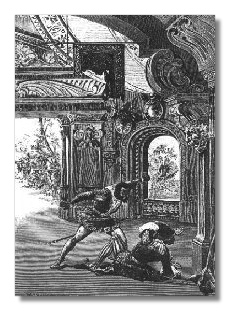
Iago tries to calm Otello, but is thrown to the floor and choked by Otello. Otello releases him and he turns as if to go. He then resigns his commission calling upon the world to see his reward for honessty. Otello comes to his senses and asks Iago to remain, suggesting perhaps he is honest. Otello's rage returns as he believes Desdemona true and yet false. He believes Iago to be true and yet false also. Otello calls for certain proof as Iago wonders what the proof could be. "Perhaps - to see them embrace?" At this, Otello becomes even more enraged as Iago goes on to comment on the difficulty of arranging this and relates a story.
Cassio and Iago were sharing sleeping quarters when Cassio, in the midst of a dream, began to talk (Era la notte). "We must hide our feelings Sweet Desdemona." The dream grew more passionate as Cassio added, "I curse the fate that sent you to that Moor!" Iago adds, "It was but a dream." "A dream that exposes fact," Otello counters. Iago adds that the dream can substantiate other evidence. He then asks if Otello has seen in Desdemona's possession a handkerchief of exquisite beauty embroidered with flowers. Otello answers it was the first gift he gave to Desdemona as a token of his love. Iago reveals that he saw that same handkerchief yesterday in Cassio's hand! Otello's rage reaches a new peak as he calls upon God to give Cassio a thousand lives, "…for one is not enough to vent my anger upon." (Ah! Mille vite gli donasse Iddio!). Otello swears off love and calls for blood. He vows on bended knee to get his vengance (Sì, pel ciel marrmoreo guiro!). Iago joins him, also on bended knee, pledging his support. Otello turns as if to leave, but points to Iago with an expression that conveys warning: "Don't mislead me or you will pay the consequences." The curtain falls swiftly.
Act III
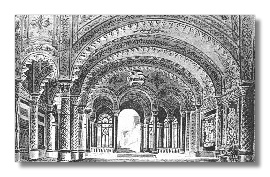
The great hall of the castle.
Otello and Iago are talking when a Herald approaches to report that the Venetian Ambassador's ship has been sighted. The Herald leaves and Iago tells Otello of his plan to lead Cassio into gossiping. He will hide Otello so he can hear and observe what occurs. Before leaving, Iago reminds Otello to be patient and remember the handkerchief. Otello angrily retorts that he could not forget it.
Desdemona enters with a warm greeting for Otello (Dio ti giocondi). Otello takes her hand and upon examining it, comments on it's beauty. Desdemona reminds him it was this hand that gave him her heart. Otello appears calm and composed. This is not to last as Desdemona once again mentions Cassio. Otello tells her his head aches again, "Bind my forehead." She offers a handkerchief, but he rejects it demanding the one he first gave to her. Desdemona fails to produce it and Otello's mood becomes quiet and dark. He explains that to lose it or give it away means terrible misfortune. He asks where it is and demands she fetch it at once. Desdemona thinks it is Otello's way of deflecting the issue of Cassio's pardon.
Otello's anger reaches the first of many peaks as he demands the handkerchief at once. Once again, she asks for Otello to pardon Cassio declaring, "There is rage in his voice." Otello seizes Desdemona and forces her to look him in the eye. "Who are you?" he asks. "The faithful wife of Otello!" She responds. He tells her to, "Swear it and damn yourself." She calls upon Otello to believe her and for God to help her. She feels his fury, but does not understand it. In beautiful phrases, Desdemona prays to heaven and adds how much she suffers for him. Otello declares if her demon were to see her now, he would think her an angel. She responds that heaven sees her honesty and asks for justice. She wonders if she is the cause of his grief asking, "What is my fault?" Otello calmly declares that she is a vile courtesan. She replies she is not, adding that she was baptized in the Christian faith. Otello suddenly changes to an ironic quiet and asks for her hand once more. He takes it and asks to make amends, declaring he thought she was the cunning whore who married Otello.
The music becomes agitated as he leads Desdemona to the door and sends her away. It then quiets almost as quickly and Otello's mood changes to one of utter dejection. He asks of God, "Why have you afflicted me in this manner?" (Dio! mi potevi scagliar) He works himself into another fit of rage declaring Desdemona will confess her sins and then die! He begins shouting for proof when Iago bursts in to report Cassio is headed their way. Iago hides Otello with a plea to control himself.
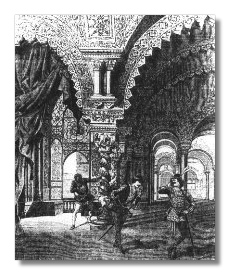
Cassio arrives and Iago engages him in conversation (Vieni l'aula e deserta). We can only hear fragments of conversation; just enough to condemn Desdemona. Cassio mentions her by name, saying that he wants to speak to her about his pardon. Iago says to wait for her here. He then asks Cassio about Bianca at which Cassio laughs. Otello sees this and thinks they are speaking of Desdemona and mocking him. He asks God to restrain his rage. Iago asks Cassio to speak quietly as he leads him further from Otello's hiding place. Cassio asks if Iago knows his lodging. Otello thinks he is telling Iago how, where and when Cassio was last with Desdemona. Otello remarks he cannot hear everything and adds, "What have I become?"
Cassio relates finding the handkerchief in his room. Iago beckons Otello closer. Cassio wishes he knew to whom it belonged. Iago asks to see the handkerchief. Making sure he has Otello's attention, he takes the cloth from Cassio and waves it for Otello to see. Otello declares it is his and swears off love and pain. "Nothing will touch my soul again!" Iago teases Cassio about admiring the cloth too much and getting enmeshed in a spider's web. Cassio continues to praise the enchanting cloth as Otello declares, "Treason! I finally have my proof!"
Trumpets and cannon fire from outside the castle announce the Venetian ships arrival. Iago sends Cassio on his way lest he should run into Otello. Left alone with Iago, Otello inquires how he should kill Desdemona. Iago ignores his question for a moment, instead asking if Otello heard the laughter and saw the handkerchief. Otello replies that he saw everything. Otello declares that, "Desdemona is condemned." He tells Iago to get him a poison for that very evening. Iago replies, no, thinking it better to, "Strangle her in the bed she desecrated. As for Cassio, Iago will provide." Otello likes the idea and promotes him to Captain. Otello sends Iago after Desdemona - the better to keep up appearances. The lights go down on the scene as trumpets announce the Venetian Ambassadors arrival.
They come back up on the same setting; however, this time the stage is full of Cypriots, dignitaries and soldiers. The chorus breaks into cheer and praise for Otello once again (Viva il Leon di San Marco!). Lodovico delivers a parchment to Otello declaring it to be from the Doge. He then turns to Desdemona asking if God is keeping her. She answers yes, as she turns to Emilia and comments on the dark cloud hanging over Otello and her destiny. Iago joins the group and greets Lodovico who asks where Cassio is. Iago counters he is in Otello's displeasure at the moment. Desdemona adds that she feels he will return to Otello's good will soon. Otello, as if he is reading the parchment, asks, "Are you sure of this?" Desdemona asks what he said and Lodovico replies that Otello was reading. Iago adds that Cassio may well return to grace. Desdemona reminds them of the affection she bears Cassio. Otello, under his breath, tells her to stop babbling. Desdemona asks Otello to repeat what he said, and he makes a menacing gesture toward her. He tells her, "Demon, Silence!" Lodovico restrains Otello, commenting, "I cannot believe what I am seeing and hearing." Otello calls for Cassio to Iago's surprise and then tells Iago to watch Desdemona when Cassio arrives. Lodovico inquires of Iago, "So this is the superb warrior?" Iago shrugs and replies, "He is what he is." Lodovico asks what he means. Iago walks away saying, "It is better to keep quiet." Otello sees Cassio arriving and tells Iago to search Cassio's soul.
Otello begins to relate the message to all when, under his breath, he tells Desdemona she is acting exceedingly well. The message is that Otello has been recalled to Venice and his successor as governor is Cassio. This upsets Iago who comments, "Hell and death." Cassio bows to Otello and says he will obey the law. Otello quietly says to Iago, "See, the scoundrel does not seem excited!" As he is announcing his departure the next day, he once again turns on Desdemona: "Continue weeping." Lodovico points out Desdemona's heartbreak when Otello seizes her and throws her to the ground exclaiming, "On your knees and weep!" (2). Desdemona, on her knees begins an ensemble with each of the following expressing their own feelings and thoughts (A terra.. sì.. nel livido fango) (3):
Emilia: Backs up Desdemona's innocence declaring Otello has no pity in his heart.
Cassio: He realizes that his elevation in rank has been at a cost to Desdemona.
Roderigo: He feels Desdemona is slipping away from him.
Lodovico: Comments on Otello's rage and lack of compassion toward Desdemona. He says this makes his heart heavy with sorrow.
Desdemona: Once alive with hope and love - now in the dust dying.
Ladies: They call upon Otello to show pity. Desdemona has been humiliated. The angels in heaven are crying.
Men: Strange! Why does Otello have so much rage? Why is he acting so Strangely?
Otello: Outside of his conversation with Iago, Otello remains silent. He wanders through the crowd and as he approaches different people, they turn away from him, not even making eye contact.
Iago approaches Otello to lay their final plans (Una parola). Iago counsels Otello to take vengance immediately as time is flying. He rouses Otello's anger once again and says that Otello will have news of Cassio's death that very evening. Iago then turns his attentions to Roderigo (I sogni tuoi sarrano in mar domani). He reminds Roderigo that tomorrow Desdemona leaves and he will remain. He plants the notion that if something should happen to Cassio, Otello would have to remain. He then tells Roderigo that he will spy on Cassio and let him know when and where to strike. Each exclaims his eagerness to see his plan to its end.
Otello rouses himself and turns on the crowd ordering them to leave. Iago offers that Otello has been struck with a sickness that has robbed him of his senses. Otello declares that anyone who does not leave is one of his enemies. Lodovico tries to lead Desdemona away, but she runs toward Otello to comfort him. Otello, however, curses her sending all fleeing in terror. Alone, Otello's agitation increases. He declares, "If only I could flee from myself." Several thoughts begin to enter his mind: "Blood! I like it not! The handkerchief! The two of them embracing!" Otello faints and falls to the floor.
Iago appears from the shadows where he has silently been observing Otello. He quietly observes his poison is working. The Cypriots continue to praise Otello. Iago, standing over the inert Otello asks, "Who could stop me now from killing the Moor?" The Cypriots are heard once again, "Long Live Otello! Glory to the Lion of Venice!" Iago takes the handkerchief from his sleeve and waving it over Otello cries, "Behold the Lion!!" He then flings the cloth contemptuously on Otello and heads upstage laughing victoriously. The Cypriots are heard praising Otello as the curtain falls swiftly.
Act IV
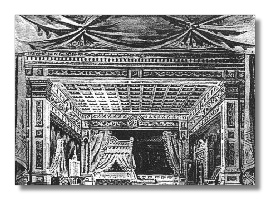
Desdemona's bedroom. It is later that evening.
After a brief orchestral prelude, Emilia asks Desdemona if Otello was calmer (Era più calmo?). She replies that he seemed so, adding that he asked her to go to bed and wait for him. She asks Emilia to get her bridal gown and lay it on the bed. She asks Emilia to make sure she is buried in it when she dies. Desdemona then tells her of her mother's maid, Barbara (Mia madre aveva). Barbara, it seems, was beautiful and in love with a man who jilted her. She used to sing "The Willow Song." Emilia begins to brush Desdemona's hair as she sings the song (Piangea cantando). They are interrupted by a noise that Emilia says is the blowing wind. Desdemona bids Emilia to leave and before Emilia can, Desdemona calls her back for an ardent embrace. Emilia reluctantly leaves.
Desdemona kneels before an image of the Madonna and intones a beautiful prayer (Ave Maria). She rises after a few moments and slips into bed.
Otello enters. He looks at Desdemona and extinguishes the candles. He goes to the bed and to the music from the first act love duet, kisses her three times. On the third kiss, she awakes and asks who is there. Otello admits it is he and asks if she has prayed yet. He adds that if she has anything to confess, that she should do it now. She asks why and he replies that he would not want to kill her soul. It is at this point that she realizes he means it. Desdemona wonders if her sin is her love of Otello, "Is this why you are going to kill me?" Otello replies, "You love Cassio! You gave him the handkerchief I gave to you." Desdemona cries out for Cassio to come and testify to her innocence. Otello quietly informs her of Cassio's death. She begs Otello to let her live for a while longer. But, it is to no avail as Otello strangles her.
We hear a knocking at the door, which Otello does not acknowledge. He looks at Desdemona and observes she is quiet as the grave (Calma come la tomba) . Emilia once again knocks and this time is admitted. Otello asks what has happened only to be told that Cassio has killed Roderigo. Otello inquires after Cassio and Emilia tells him that Cassio lives. Otello's anger resurges. Desdemona, on the verge of death declares, "Unjustly murdered!" Emilia finds Desdemona and asks who has done this to her. Desdemona answers, "No one, myself." She then asks Emilia to commend her to the Lord, and expires. Otello states, "O Liar!! I killed her because she was the mistress of Cassio. Iago can back this up." Incredulously, Emilia asks if Otello believed him. Otello answers yes and makes a threatening gesture toward her. She runs screaming from the room that, "Otello's killed Desdemona!"
Lodovico, Iago, Cassio, Montano and guards enter the room exclaiming their horror at the sight of the dead Desdemona. Emilia calls upon Iago to disprove Otello's belief that Desdemona was unfaithful. Iago counters that he believed her so. Otello tells of the handkerchief being in possession of Cassio. Emilia ignores Iago's command of silence and tells of Iago taking it from her by force. Cassio adds that he found it in his house. Montano points to Iago and reports the dying Roderigo revealed the whole plot of Iago. Otello calls upon Iago to disprove the charges to which Iago responds: "NO!" Iago leaves followed by the guards who are ordered to stop him.
Picking up his scimitar, Otello asks if anything else will fall on him from heaven. Lodovico steps forward and demands he surrender his sword. Otello threatens him and launches into the Death of Otello (Niun mi tema). He surrenders the scimitar and goes to Desdemona lying on the bed. He laments her beauty and her passing. He draws another dagger from his robe and stabs himself. Dying, he crawls to Desdemona and to the music from Act I, kisses her. He asks for another and yet another kiss. He collapses and expires onto the bed. Solemn chords close the scene.
Footnotes
- Brindisi means a drinking song.
- In some productions, Otello actually strikes Desdemona.
- This is termed a Largo Concertato wherein the passage of time is suspended and the singers forget about each other and pour out their feelings to the footlights in a glorious web of lyrical sound. (Budden 1984, 3:306.)
Illustrations
- Act II - O sulla tua testa / s'accenda e precipiti il fulmine / Del mio spaventoso furor che si desta (Hepokoski, 1987, 110.)
- Act III - The handkerchief scene. (Sadie, 1980, 3:792.)
- Scene sketches. (Hepokoski, 1987, 112-3.)
Copyright © 1996, Stephen L. Parker.













